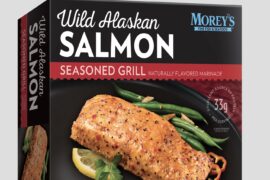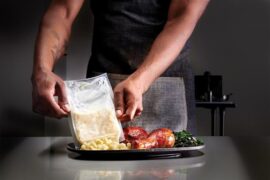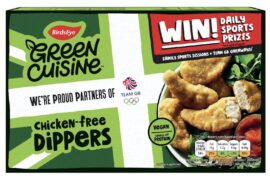Sainsbury’s, the second largest supermarket chain in the United Kingdom, has unveiled a plan to cut plastic packaging usage by 50% at its stores by 2025. This new target includes all branded food packaging, Sainsbury’s private label food packaging and packaging across all commercial platforms.
It should be pointed out that Low Density Polyethylene (LDPE) polymer packaging used by the frozen food industry accounts for a very small percentage in the breakdown of plastic packaging by polymer type. The big percentages (see pie chart above) are attributed to widely recyclable Polyethylene Terephthalate, or PET bottles, jars, and cosmetic bottles; High Density Polyethylene, or HDPE shampoo bottles, cereal box liners and grocery bags); and Polypropylene, or PP buckets, crates and bottle caps.
The retailer, which succeeded in reducing plastic usage by 1% in 2018, currently uses almost 120,000 tons of plastic packaging per year and believes a “transformational leap in thinking” is required to move the industry beyond existing efforts at reducing packaging.To meet this goal, the supermarket company is launching a program to accelerate change, which will include switching to alternative materials, using lighter-weight plastics and introducing refillable packaging at scale. Following rigorous analysis of its plastic footprint, the key areas of focus for the biggest impact are: plastic milk bottles, packaging for fruit and vegetables, fizzy drinks, water and fruit juices.
Some of these alternatives will require customers to change their behavior – for example, plastic milk bottles are currently one of the largest sources of plastic packaging. Sainsbury’s is reviewing alternative options including the introduction of refillable containers, introducing returnable milk bottles or offering a reusable jug with milk in a lightweight plastic pouch.

The retailer recognizes it cannot achieve this commitment on its own. As such, Sainsbury’s aims to pioneer new ways to collaborate with food manufacturers, packaging suppliers, raw material scientists and fellow grocery sellers, alongside the waste and recycling industry. To kick start this collaboration, it co-hosted a summit with the Natural Environment Research Council (NERC), part of UK Research and Innovation (UKRI), on September 13, which brought together branded suppliers, researchers and government stakeholders to identify potential breakthrough innovation projects.
Sainsbury’s is also looking to open source ideas. It now has an area on its website for customers, colleagues, manufacturers, entrepreneurs and other interested parties to submit ideas to help reduce plastic packaging: www.about.sainsburys.co.uk/helpreduceplastic.
The company will work with Greenpeace on this commitment and will report publicly on progress every six months.
“We have set ourselves a bold ambition because we understand that we urgently need to reduce our impact on the planet and to help drive change across our industry,” said Sainsbury’s Chief Executive Mike Cope. “Reducing plastic and packaging is not easy. Packaging plays a vital role in keeping our food safe and fresh and minimizing food waste. We must therefore find alternatives to plastic that protect the quality of our food while minimizing our impact on the environment.
“We can’t do this on our own and we will be asking our suppliers and our customers to work with us to help us make this important change.”
UK Environment Secretary Theresa Villiers commented: “I commend the leadership shown by Sainsbury’s and their efforts to introduce new industry-wide standards and reporting, ensuring that our environment is protected for future generations. This is a brilliant example of the integral role business has to play in cutting plastic waste, empowering consumers to make more sustainable choices.”
Sainsbury’s will continue to work and step up cooperation with suppliers and other partners to develop and implement innovative solutions to the plastics challenge, including through collaborative project bids within the British Government’s new £60m Smart Sustainable Plastic Packaging challenge program: https://www.gov.uk/government/news/uk-to-lead-global-innovation-in-sustainable-plastics-in-drive-to-net-zero

Meanwhile, the company has detailed existing plastic reduction commitments as follows:
Remove
• Lightweight loose produce bags will be removed by September 2019 (489 tons)
• Plastic trays are being removed from asparagus and sweetcorn (144 tons); cream pots (114 tons); tomatoes (102 tons); carrots (38 tons); and herb pots (18 tons)
• Plastic has already been removed from cauliflowers, organic bananas, easy peeler citrus fruit, brassicas and tomatoes
• Microbeads were removed from own label products in 2013
Replace
• Fresh food black plastic trays will be replaced with recyclable alternatives (6,000 tons) by end of this year
• PVC and polystyrene trays will be replaced with recyclable alternatives (1213 tons)
• Plastic film on fruit and vegetables will be replaced with a recyclable alternative (2518 tons) by end 2020
• All own label flushable wipes are plastic free and compliant with industry guidelines which are recognized across the UK and Europe. Sainsbury’s is also working to meet the new “Fine to Flush” standard in the future while ensuring the quality of the product is not compromised.
• Plastic cutlery was replaced with wooden cutlery in Food to Go, saving 38 tons of plastic
Re-use
• Fresh water stands will be available for customers to refill their own water bottles in 326 supermarket cafe’s across the country
• Customers are encouraged to bring their own containers to meat and deli counters

Recycle
• A “pre-cycle” area will be trialed in stores for customers to remove unwanted packaging and leave it for recycling
• Customers will be able to use recycling facilities at a further 125 stores (currently 275).
• Collaboration with others on research to develop new packaging and recycling technologies
• Deposit Return Schemes are being piloted so customers can return recyclable packaging simply and easily
This month (September) Sainsbury’s will remove single use plastic bags from bakery aisles and single use plastic bags from loose produce – taking a total of 489 tons of plastic out of the picture.
The retailer has previously committed to making all plastic packaging recyclable, reusable or compostable by 2023.
In 2005, Sainsbury’s signed up to the Courtauld Commitment, a voluntary government target to reduce packaging in the grocery sector. This agreement focused on reducing the weight of packaging and resulted in retailers reducing glass and fiberboard packaging in favor of lighter weight and more versatile plastic packaging.





